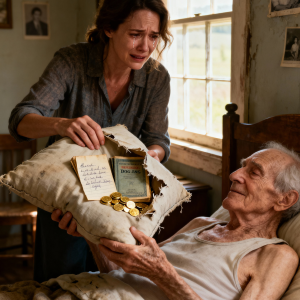
The night still haunted Vivienne Laurent. She remembered standing on the threshold of the townhouse she had once called home in Portland, Oregon, clutching her five-year-old son, Leo, close to her chest. The man she had loved, Adrian Vaughn, looked at her with an unsettling calm that made her skin crawl. There was no anger, no shouting, only a cold, measured cruelty in his voice.
“You have to leave tonight, Vivienne,” he said, his tone detached as if he were delivering a corporate directive rather than shattering a family. “This place no longer belongs to you.”
Vivienne’s heart skipped a beat. “Adrian, what are you talking about? Leo—”
Before she could finish, a woman appeared from the living room. Tall, elegant, and radiating confidence, she rested a hand lightly on Adrian’s arm. Vivienne’s stomach sank. Juliette Kane. She had always suspected their closeness, but she had never confronted it. Now the truth was undeniable.
Adrian’s expression twisted into a smirk. “Without me, you and that child have nothing,” he said. “No money, no support. You will starve if you think you can survive on your own.”
Vivienne wanted to scream, to fight back, but Leo’s trembling fingers wrapped around her wrist, anchoring her resolve. That night, with tears blurring her vision, Vivienne packed what little she could carry and stepped into the cold night air, leaving behind the life she had believed was secure.
The first days were merciless. Vivienne found temporary shelter in a women’s refuge, lying awake on a narrow cot while listening to Leo’s soft breathing. Her husband’s words reverberated in her mind, but they fueled a determination she had never known. She would not let her son grow up believing that a single person could decide their worth.
She began searching for work immediately. Years of domestic life had left a gap in her résumé, but Vivienne had earned a degree in economics and retained a sharp mind for numbers. Applications were met with polite rejections until a small investment consultancy offered her a junior analyst position.
Her new life was grueling. Early mornings began with bus rides and daycare drop-offs, and late nights were spent poring over financial reports. Vivienne’s sacrifices were countless—sometimes skipping meals, sometimes foregoing rest—but each step brought her closer to stability.
Her dedication did not go unnoticed. Thomas Gallagher, her supervisor, quickly recognized her talent. Vivienne took on complex assignments others avoided, often working through weekends to deliver detailed analyses. Within months, she had earned a reputation as someone precise, unflinching, and uncommonly insightful.
But Vivienne had another target in mind. Adrian’s company, Vantage Dynamics, was publicly listed, and she began quietly studying its financial statements. Mistakes and risky investments were glaringly apparent. The more she analyzed, the more confident she became that she could leverage her savings to acquire shares in the company Adrian thought he still controlled.

Over the next year, she meticulously invested her modest earnings, living frugally and making careful financial decisions. Each paycheck, each bonus, added to a growing stake in the company Adrian thought he still controlled. Irony became a quiet companion; the man who once claimed she would starve had unwittingly funded her resurgence.
The turning point came when Vivienne received an official invitation to the annual shareholder meeting. Her hands trembled as she read it. This was no longer merely about survival. This was about reclaiming agency over a life that had been stolen.
The meeting took place in a luxury hotel ballroom. Shareholders murmured anxiously about Vantage Dynamics’ shaky profits, and Adrian stood at the podium, polished but tense. When it was time for public comment, Vivienne rose. Whispers filled the room as she walked forward.
“Good afternoon,” she began, her voice calm but commanding. “My name is Vivienne Laurent. I am a shareholder in Vantage Dynamics and someone who has witnessed firsthand the recklessness of its leadership.”
Adrian attempted to interrupt, but she continued. Her presentation was meticulous, highlighting mismanaged acquisitions, escalating debt, and faltering investor confidence. “The company needs leadership with accountability and foresight,” she concluded. “I am ready to serve on the board to protect its future.”
Applause erupted from many shareholders, weary of Adrian’s empty promises. By the end of the day, Vivienne had secured enough votes to join the board. Within weeks, Adrian was ousted from his CEO position, powerless in the presence of the woman he had once discarded.
Outside the hotel, Vivienne held Leo’s hand. The boy looked up with wide eyes and asked, “Does this mean you’re the boss now, Mom?”
Vivienne smiled, a mixture of relief and triumph. “It means we will never again be told we are nothing,” she said. That night, as the city lights of Portland shimmered around them, Vivienne knew they had reclaimed more than power—they had reclaimed their lives.



